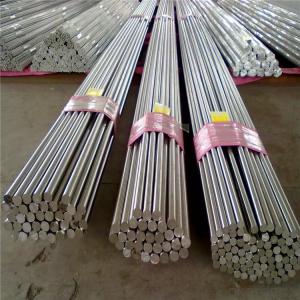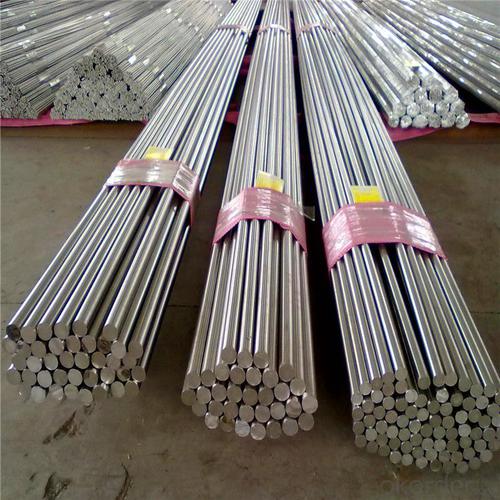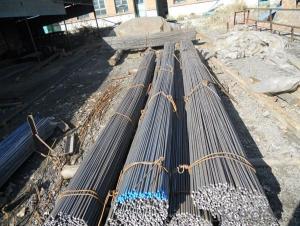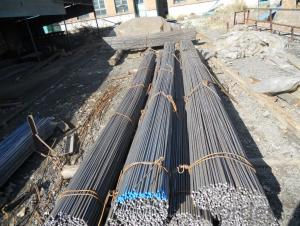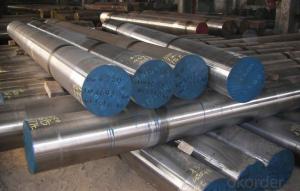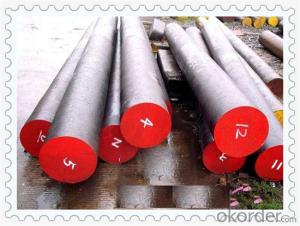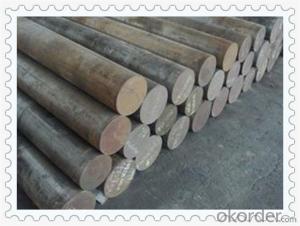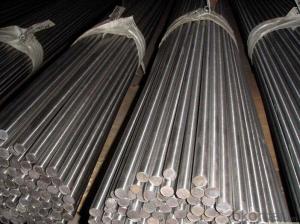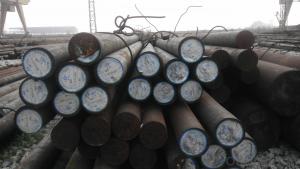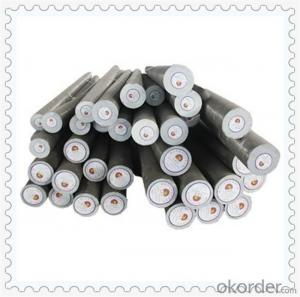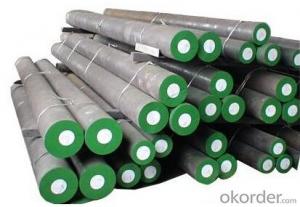JIS Hot Rolled Structural Steel Bar SCM440
- Loading Port:
- Tianjin
- Payment Terms:
- TT OR LC
- Min Order Qty:
- 100 m.t.
- Supply Capability:
- 50000 m.t./month
OKorder Service Pledge
OKorder Financial Service
You Might Also Like
Specification
JIS Hot Rolled Structural Steel Bar SCM440
Product Description of JIS Hot Rolled Structural Steel Bar SCM440
1. Steel grade: ASTM4140, SCM440, 42CrMo, DIN1.7225
2. Length: 6M-12M
3. Diameter: 16mm-300mm
4. Product range: round bar, flat bar, square bar
5. Technique: Hot rolled, forged, cold drawn
Specification of JIS Hot Rolled Structural Steel Bar SCM440
Material | SCM4140 | Round bar | Dia(mm) | 16-300mm |
Process | EAF + LF + VD + Forged + Heat Treatment (optional) | Length (mm) | Max 12m | |
Heat treatment | Normalized / Annealed / Quenched / tempered | Flat bar | Thickness(mm) | 8-500mm |
Delivery condition | Hot forged +Rough machined (black surface after Q/T)+ Turned (optional) | Width(mm) | 70-200mm | |
Test | Ultrasonic test according to SEP 1921-84 D/d | Length (mm) | Max 12m |
Chemical Composition of JIS Hot Rolled Structural Steel Bar SCM440
C | Si | Mn | Cr | Mo | P | S |
0.38~0.43 | 0.15~0.35 | 0.75~1.00 | 0.8~1.1 | 0.15~0.25 | ≤0.035 | <0.04< td=""> |
Photo Show of JIS Hot Rolled Structural Steel Bar SCM440
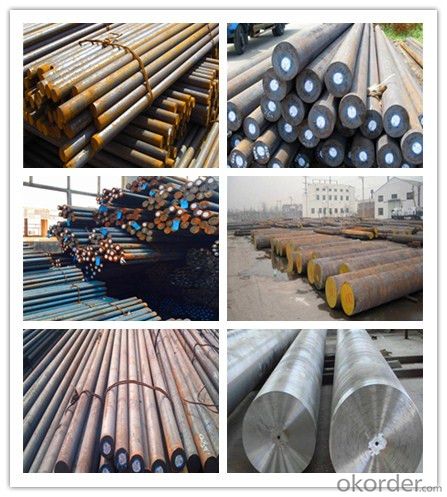
Packing and Delivery:
Packing in bundle package, or as customer's requirements.
Delivery Detail: 45 days after receiving the deposit.
Usage and Applications of JIS Hot Rolled Structural Steel Bar SCM440
1. Steel round bar is used in a large number of architectural and engineering structures. Or it can be used in construction of plants for the production of steel house frames, high-voltage transmission towers, bridges, vehicles, boilers, containers, ships, etc.
2. And we can use this kind of product on the performance of the mechanical parts if the demand is not very high.
3. Some special material steel round bar can be used for main shaft of steamer, hummer shank, with big section and supper force.
Company Information
CNBM International Corporation is the most important trading platform of CNBM group.
Whith its advantages, CNBM International are mainly concentrate on Cement, Glass, Iron and Steel, Ceramics industries and devotes herself for supplying high qulity series of refractories as well as technical consultancies and logistics solutions.


F A Q
1, Your advantages?
professional products inquiry, products knowledge train (for agents), smooth goods delivery, excellent customer solution proposale
2, Test & Certificate?
SGS test is available, customer inspection before shipping is welcome, third party inspection is no problem
3, Factory or Trading Company?
CNBM is a trading company but we have so many protocol factories and CNBM works as a trading department of these factories. Also CNBM is the holding company of many factories.
4, Payment Terms?
30% TT as deposit and 70% before delivery.
Irrevocable L/C at sight.
5, Trading Terms?
EXW, FOB, CIF, FFR, CNF
6, After-sale Service?
CNBM provides the services and support you need for every step of our cooperation. We're the business partner you can trust.
For any problem, please kindly contact us at any your convenient time.
We'll reply you in our first priority within 24 hours.
- Q: How are steel round bars used in the construction of tunnels and underground structures?
- Steel round bars are commonly used in the construction of tunnels and underground structures as reinforcement for concrete. These bars are placed within the concrete to provide strength and stability, preventing the structure from cracking or collapsing under pressure. The steel round bars also enhance the overall durability and load-bearing capacity of the tunnel or underground structure, ensuring its long-term structural integrity.
- Q: Can steel round bars be used in the production of forgings?
- In the production of forgings, steel round bars can be utilized. These round bars are commonly employed as the primary materials in forging procedures. To shape them, the round bars are heated to a specific temperature and then subjected to diverse forging techniques like hammering, pressing, or rolling. Through the application of heat and pressure during the forging process, the mechanical properties of the steel are improved, rendering it stronger and more enduring. Steel round bars are highly suitable for forging production as they ensure a consistent and uniform shape, guaranteeing that the final product adheres to the required specifications. Furthermore, steel round bars offer versatility in terms of their size, grade, and composition, allowing for a wide range of applications across various industries such as automotive, aerospace, and construction.
- Q: Are steel round bars corrosion resistant?
- No, steel round bars are not inherently corrosion resistant. Steel is primarily made of iron, and iron is prone to rusting when exposed to moisture and oxygen. However, there are certain types of steel that are specifically designed to be corrosion resistant. These types of steel, such as stainless steel, contain additional alloying elements like chromium and nickel, which form a protective layer on the surface of the steel, preventing rust and corrosion. So, while regular steel round bars are not corrosion resistant, there are corrosion-resistant options available in the form of stainless steel round bars.
- Q: What is the difference between hot rolled and cold drawn steel round bars?
- Hot rolled steel round bars are made by heating a billet or ingot of steel to a high temperature and then rolling it into the desired shape. This process results in a rougher surface finish and less precise dimensions compared to cold drawn steel round bars. Cold drawn steel round bars, on the other hand, are made by pulling a hot rolled bar through a die to achieve the desired shape and size. This process produces a smoother surface finish and more accurate dimensions. Overall, the main difference between hot rolled and cold drawn steel round bars lies in the manufacturing process and the resulting surface finish and dimensional accuracy.
- Q: What is the maximum chromium content allowed for steel round bars?
- The maximum chromium content allowed for steel round bars depends on the specific grade or specification of the steel. Generally, the chromium content in steel round bars can range from 0.15% to 30%, but this can vary greatly depending on the intended application and desired properties of the steel. Higher chromium content is often found in stainless steel grades, which are known for their corrosion resistance. It is important to consult the relevant industry standards or specifications to determine the maximum chromium content allowed for specific steel round bars.
- Q: Can steel round bars be used for making tools or machinery parts?
- Yes, steel round bars can be used for making tools or machinery parts. Steel round bars are commonly used in the manufacturing industry due to their high strength, durability, and ability to withstand heavy loads. They can be machined, forged, or welded into various shapes and sizes to create different tools and machinery parts.
- Q: Why do I use the M25 round bar for the embedded bolt M24?
- Such as using 24 of the round steel, worried about the surface quality of steel when the processing can not be nominal diameter 24 of the standard thread, of course, the election is too large and wasteful, so generally choose 25 of the round bar,
- Q: Can steel round bars be used in the construction equipment industry?
- Yes, steel round bars are commonly used in the construction equipment industry. Steel round bars are known for their strength, durability, and versatility, making them suitable for various applications in construction equipment. They can be used to manufacture components such as axles, shafts, pins, and fasteners. The high strength of steel round bars ensures that the construction equipment can withstand heavy loads and harsh working conditions. Additionally, steel round bars can be easily machined and welded, allowing manufacturers to create complex and customized designs for construction equipment. Overall, steel round bars are widely utilized in the construction equipment industry due to their exceptional mechanical properties and ability to enhance the performance and longevity of the equipment.
- Q: What are the corrosion resistance properties of steel round bars?
- Steel round bars have excellent corrosion resistance properties due to the presence of alloying elements such as chromium, nickel, and molybdenum. These elements form a protective oxide layer on the surface of the steel, preventing the metal from coming into contact with corrosive substances. Additionally, stainless steel round bars are highly resistant to rust and corrosion caused by exposure to moisture, chemicals, and atmospheric conditions, making them suitable for various applications in industries such as construction, marine, and manufacturing.
- Q: What are the different heat treatment methods for steel round bars?
- There are several heat treatment methods that are commonly used for steel round bars to enhance their mechanical properties and improve their overall performance. These methods include annealing, normalizing, quenching, tempering, and case hardening. 1. Annealing: This heat treatment process involves heating the steel round bars to a specific temperature and holding it there for a certain amount of time to achieve a uniform microstructure. Annealing helps to relieve internal stresses, increase ductility, and improve machinability. 2. Normalizing: In this method, the steel round bars are heated to a temperature slightly above their critical transformation temperature and then cooled in still air. Normalizing refines the grain structure of the steel, improves its mechanical properties, and enhances its resistance to impact and fatigue. 3. Quenching: Quenching involves heating the steel round bars to a temperature above its critical temperature and then rapidly cooling it by immersing it in a quenching medium such as oil, water, or brine. This rapid cooling hardens the steel, making it stronger and more resistant to wear and abrasion. However, quenched steel can be brittle, so additional heat treatment steps may be required. 4. Tempering: After the quenching process, the steel round bars are often tempered to reduce brittleness and improve toughness. Tempering involves reheating the quenched steel to a specific temperature and holding it there for a specific time, followed by slow cooling. This process helps to reduce internal stresses, increase ductility, and improve the steel's overall toughness and machinability. 5. Case Hardening: Case hardening is a surface heat treatment method used to increase the hardness of the outer layer of the steel round bars while maintaining a relatively softer core. This process involves heating the steel in a carbon-rich environment, such as a gas or salt bath, and then quenching it to achieve a hardened outer layer. Case hardening improves wear resistance and fatigue strength, making the steel suitable for applications where high surface hardness is required. It's important to note that the specific heat treatment method used for steel round bars depends on the desired mechanical properties and the intended application of the product. Manufacturers carefully select the appropriate heat treatment method based on factors such as the composition of the steel, the desired hardness, and the required strength.
Send your message to us
JIS Hot Rolled Structural Steel Bar SCM440
- Loading Port:
- Tianjin
- Payment Terms:
- TT OR LC
- Min Order Qty:
- 100 m.t.
- Supply Capability:
- 50000 m.t./month
OKorder Service Pledge
OKorder Financial Service
Similar products
Hot products
Hot Searches
Related keywords
